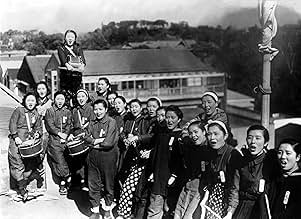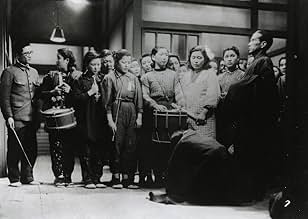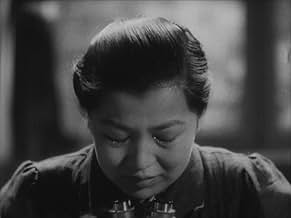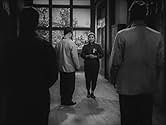IMDb RATING
5.6/10
2.7K
YOUR RATING
World War II film about female volunteer workers at an optics plant who do their best to meet production targets.World War II film about female volunteer workers at an optics plant who do their best to meet production targets.World War II film about female volunteer workers at an optics plant who do their best to meet production targets.
- Director
- Writer
- All cast & crew
- Production, box office & more at IMDbPro
Featured reviews
A curious film from Kurosawa, given what came later, this is a nationalist film about a group of young women who are working at an optical instruments factory who are given the task to greatly increase productivity for the good of the country and the war effort. It shows them rarely at play, mostly very focused at work. Takako Irie plays the dorm mother, a somewhat sympathetic character. This film is more inherently Japanese than most of Kurosawa's later work, its almost a propaganda film. However, there is also some heart in the characters, and that is what makes it a recommended film. You sense the young ladies anguish over being sick and having family difficulties, making them unable to work. So, not essential viewing but still watchable and Kurosawa fans should check it out.
Typical of Japanese war-time propaganda, the film suggests that Japan's fascist ideology, its inculcation of fanatical obedience, its vast perpetration of unthinkable atrocities in a systematic manner, and its aggressive military expansionism can all be replaced by Japan's supposed victimization. Rather telling in this respect is the song that the girls repeatedly sing to boost morale, a song that recalls that barbarian Mongol conquerors once tried to invade Japan from China, but that the perpetrators of such heinous deeds of aggression could not possibly co-exist under the same sky with the innocent and pure Japanese-- this, of course, is being sung during a war that was begun when an utterly unprovoked Japan invaded China and slaughtered untold numbers of its population mercilessly.
All of this would be something that one could simply shrug off as the past blindness of war, but films such as these are more disturbing today than, say, Triumph of the Will because while Germany was forced to confront the horrors it had unleashed upon the world, most Japanese films even today (and textbooks for that matter) still tend to view Japan as a victim in the war (see, for instance, Kurosawa's own Rhapsody in August so many decades later). Assisted by the policies of the American post-war occupation, Japan has never had to come to terms with what it did to the planet, and what in human history can possibly more disturbing than a lack of accountability for the worst sins humanity can commit? And by the way, I say all of this despite the fact that Kurosawa is probably my favorite director.
All of this would be something that one could simply shrug off as the past blindness of war, but films such as these are more disturbing today than, say, Triumph of the Will because while Germany was forced to confront the horrors it had unleashed upon the world, most Japanese films even today (and textbooks for that matter) still tend to view Japan as a victim in the war (see, for instance, Kurosawa's own Rhapsody in August so many decades later). Assisted by the policies of the American post-war occupation, Japan has never had to come to terms with what it did to the planet, and what in human history can possibly more disturbing than a lack of accountability for the worst sins humanity can commit? And by the way, I say all of this despite the fact that Kurosawa is probably my favorite director.
Ichiban utsukushiku (1944) 'THE MOST BEAUTIFUL' is Akira Kurosawa's tribute to Japanese Women who supported the war effort (WWII) at the 'Home-Front'. It is analogous to films made in other countries at that time. The nations that participated in the conflict all called upon Women too help in the manufacturing process. Some successfully like Great Britain, Soviet Russia and the U.S.A. Others like China, Fascist Italy or Nazi Germany less so, with Imperial Japan falling in between. Not from lack of effort, but of resources.
Like LETTERS FROM IWO JIMA (2006) the film shows the war from the Japanese perspective. This is a propaganda film. That does not invalidate its message compared with the other participants in the conflict, it is just another point of view, made in wartime. The Women work in a optical factory which could pass for a 'Dickensian Workhouse'. Their work is important and they know it. The pressure of increased productivity with limited resources is clearly shown. It effects them all emotionally, physically and psychologically. The Men of the factory for the most part are unseen drones, except for the managers of the plant. They take a sensitive interest in the well being of their Female staff, without taking advantage of them. The War is largely unseen, but you know it is out there and getting closer all the time. The Director could see the end was coming, even if the Imperial General Staff could not.
The principal cast of Women actors are largely unknowns whose careers were brief before and after this film. They are all convincing in their roles and give believable characterizations. The only 'Star' recognizable too Western audiences would be the great TAKASHI SHIMURA. SHIMURA was a 'jake of all trades' for the TOHO Studios, Japan. His acting range spanned Business Men, Criminals, Detectives, Samurai and Scientists. Films of note, SHICHININ NO SAMURAI (1954) 'The Seven Samurai', GOJIRA (1954) 'Godzilla', CHIKYU BOEIGUN (1957) 'The Mysterians' and YOJIMBO (1961) 'Yojimbo, The Bodyguard'.
Those who have TCM or a well stocked local Library can take advantage of the films of AKIRA KUROSAWA and they should.
Like LETTERS FROM IWO JIMA (2006) the film shows the war from the Japanese perspective. This is a propaganda film. That does not invalidate its message compared with the other participants in the conflict, it is just another point of view, made in wartime. The Women work in a optical factory which could pass for a 'Dickensian Workhouse'. Their work is important and they know it. The pressure of increased productivity with limited resources is clearly shown. It effects them all emotionally, physically and psychologically. The Men of the factory for the most part are unseen drones, except for the managers of the plant. They take a sensitive interest in the well being of their Female staff, without taking advantage of them. The War is largely unseen, but you know it is out there and getting closer all the time. The Director could see the end was coming, even if the Imperial General Staff could not.
The principal cast of Women actors are largely unknowns whose careers were brief before and after this film. They are all convincing in their roles and give believable characterizations. The only 'Star' recognizable too Western audiences would be the great TAKASHI SHIMURA. SHIMURA was a 'jake of all trades' for the TOHO Studios, Japan. His acting range spanned Business Men, Criminals, Detectives, Samurai and Scientists. Films of note, SHICHININ NO SAMURAI (1954) 'The Seven Samurai', GOJIRA (1954) 'Godzilla', CHIKYU BOEIGUN (1957) 'The Mysterians' and YOJIMBO (1961) 'Yojimbo, The Bodyguard'.
Those who have TCM or a well stocked local Library can take advantage of the films of AKIRA KUROSAWA and they should.
This is a great movie - a must-see. I saw it without subtitles, and my Japanese wasn't good enough to catch most of the dialog, but the raw emotional power of the cast and of the imagery made it easy to follow - completely engrossing, in fact. The story is about a group of women factory workers in WWII Japan, and how each one must overcome whatever personal hardship they face to help the group succeed. The sense of being swept up in a titanic struggle, and the almost superhuman selflessness and group cohesion that that breeds, are the same themes treated in "Twelve-O'clock High". The two movies would make an enlightening double feature. One image sticks with me: although it's not focused on, throughout the movie you see the women carefully taking off their shoes and placing them neatly by the door as they come in to the dormitory, and you see them carefully put them on as they leave. During one scene, when a girl is returning from the hospital, everyone rushes to greet her. Kurosawa cuts to a shot of the shoes, as they are thoughtlessly trampled by the women eager to meet their friend.
During the World War II, the management of a war industry of optical instruments for weapons requests an effort from the workers to increase the productivity during four months. The target for male workers is an increase of 100% of the production, but the female workers, led by the dedicated Tsuru Watanabe (Yôko Yaguchi), ask the direction to surpass their goal from 50% to 70%. Along the period, the women have to overcome illness and their personal problems to complete their quote.
"Ichiban Utsukushiku" is a war propaganda and tribute to the Japanese female workers in times of war by Akira Kurosawa recommended only for fans of this great director. The plot is boring in many moments, but I liked to see the humanization of the nationalist Japanese workers and this unusual perspective from a people that were sooner defeated in the war. The winners usually write the history from their perspective and this film is a rare testimony from the Japanese point of view. Watanabe is an enlightened character with her dedication and positive leadership. My vote is six.
Title (Brazil): "A Mais Bela" ("The Most Beautiful")
"Ichiban Utsukushiku" is a war propaganda and tribute to the Japanese female workers in times of war by Akira Kurosawa recommended only for fans of this great director. The plot is boring in many moments, but I liked to see the humanization of the nationalist Japanese workers and this unusual perspective from a people that were sooner defeated in the war. The winners usually write the history from their perspective and this film is a rare testimony from the Japanese point of view. Watanabe is an enlightened character with her dedication and positive leadership. My vote is six.
Title (Brazil): "A Mais Bela" ("The Most Beautiful")
Did you know
- TriviaIn order to save film during wartime, the Japanese government ordered films to be released to have no opening titles and thus giving no credit to most of the actors or workers on each film. This included "The Most Beautiful" (1944).
- ConnectionsReferenced in Kurosawa: The Last Emperor (1999)
- How long is The Most Beautiful?Powered by Alexa
Details
- Runtime
- 1h 25m(85 min)
- Color
- Sound mix
- Aspect ratio
- 1.37 : 1
Contribute to this page
Suggest an edit or add missing content






























